- Skip to primary navigation
- Skip to main content
- Skip to primary sidebar
- Skip to footer

An Example on How to Write an Autobiography for a Scholarship
What goes into writing an autobiography for a scholarship? How do you make it worth a read? With the help of the example provided below, you can learn how to write one for yourself.

Funding a college education is difficult for most, which is why attaining a scholarship becomes important for students. However, not everyone is eligible for a scholarship, and a lot needs to be done to get that help with funding an education that will simply ease your worries a little. One such thing is proving why only you are eligible for that scholarship by providing an autobiography that explains your abilities and your worth for this funding. Now, what goes into a good autobiographical essay for a scholarship? Here, we provide you with an example that will help you get that scholarship.
How to Write an Autobiography for Scholarship
When writing your autobiography, focus on what your grade sheets, letters of recommendation, and other additional documents you have given for your admission do not focus on. This is your chance to prove your suitability for a scholarship. Your transcripts already reflect your GPA, and your letters of recommendation already show what others believe you are capable of. In an autobiography, you can show what you believe you are capable of. Unless relevant, don’t mention where you grew up, which school you went to, or how your friends changed your life. Only mention experiences as relevant as they can get to your cause and directly improve your chances of getting the scholarship. After taking a look at the example provided below, you should be able to get an idea of how you would like to go about writing your own.
As you can see, the sample focuses on the person’s belief in herself and what she would do with the education that would be funded with the scholarship. Similarly, ideally even you should focus on the same subject and ensure that you definitely are a worthy candidate for the scholarship. As long as you do your best, you can leave the rest to the discretion of the scholarship committee. Good luck!
Like it? Share it!
Get Updates Right to Your Inbox
Further insights.

Privacy Overview
- Apply to College
- Applying For Scholarships
About Yourself College & Scholarship Essay Examples (2024)
Jennifer Finetti Oct 20, 2024

Get our best scholarship practices, insights & tips delivered to your inbox
Thank you for subscribing!
A popular scholarship essay prompt is “Tell us about yourself.” This question is relatively open-ended, which may make it difficult to answer at first glance. What should I tell them about myself? My struggles, my goals, my passions…? These may all be fitting topics, depending on the scholarship. We’ll show you some scholarship essay examples about yourself, along with writing tips to guide you along the way.
What they want to know about you
As you prepare to write, think of the topics the scholarship committee would be interested in. These may include:
- Your current degree, as it applies to your overall career goals. You can explain why you chose your current educational path and what you want to do with that.
- Your short-term and long-term professional goals . Frame your answer as if to say “Where will you be in 5 years? Where will you be in 10 years?” Scholarship committees like to reward people with defined aspirations.
- Past experiences that sparked your passions. You could talk about an influential person in your life, but make sure most of the essay focuses on you. After all, you are talking about yourself.
- Something about you that relates to their organization. With any scholarship essay, you should try to connect yourself with the organization providing the funding. Don’t force a connection. Find one that naturally fits. Mention hobbies, experiences and goals that match what the review committee is looking for.
- Something unique that sets you apart from other applicants. This may be volunteer experience, career specialties, situational differences (growing up in an area that didn’t encourage education), etc.

Note that you do not have to throw all this information into one essay. Choose the elements that best fit the scholarship. If you were on the review board, what would you want to learn about each applicant? What would make you choose one applicant over another? Keep this in mind as you develop your thoughts.
The fastest path to earning scholarships
Simplify and focus your application process with the one-stop platform for vetted scholarships.
What they don’t want to know about you
There is plenty of information you could include in an about yourself scholarship essay. There is just as much information to avoid though. Some topics to keep out of your essay include:
- False information. Do not make up stories or fabricate goals to fit the prompt. The scholarship committee can instantly tell when someone is lying, and they will disqualify you immediately.
- Past struggles that do not pertain to the essay topic. You can briefly mention struggles from your past, as long as you mention how you’ve learned from them. Do not make your essay a long story about the hard life you’ve led. Focus on your triumphs, not your obstacles.
- Vague goals and aspirations. Scholarships are usually given to students who have a plan. If you say, “I’m not sure what I’m doing yet,” the committee will select a more motivated candidate. If you have a plan and a backup plan, that’s fine. Just make sure you mention both options and show which one you favor.
- Cliché stories that most people tell. There is something that makes you stand out as a person. Use that to your advantage. Don’t rely on generic information they’ll find with other applicants.
- Unrelated elements of your personal life. In most cases, you should not mention your significant other in the essay. You might mention a spouse if you need to reference your children or a turning point in your life, but these personal details do not fit most essays. Any information that seems frivolous or ill-placed should be removed from the essay.
Read through your essay carefully. If you stop at one point to say, “Why did I mention that?” get rid of the corresponding information. Showcase the best elements about yourself in a fluid and cohesive manner.
Short scholarship essay example: Tell us about yourself (100 Words)
With 100 words, you can only focus on one or two elements of your life. Think about your biggest selling points – the things that show you are the ideal candidate. Start by introducing yourself and your educational status. Then jump into the main topic of the essay. You may not have room to mention how the scholarship will help your education. Instead, mention how your education can help your career. The other information will be implied.
My name is Christian Wood. I am a high school senior who will be attending the University of Nevada, Reno in the fall. I want to become an online journalist. My goal is to work for the Wall Street Journal, Bloomberg, Huffington Post, or another news outlet that has a strong online presence. Most people already get their news on the internet, and the industry will be even bigger by the time I graduate. Getting a degree in journalism with a focus on digital media will set me up for a fulfilling, fast-paced career fit for the future.
Word Count: 96
Medium scholarship essay example: Tell us about yourself (250 Words)
With a mid-length scholarship essay, you have more space to explain how your past has influenced your present and future goals. You should have rom for an intro paragraph, a few body paragraphs, and a conclusion (maybe incorporated into the last body paragraph). Think of a few main points you want to touch on, and write those down first. If you still have room, you can add more details about yourself.
My name is Sarah, and I spent most of my childhood on the wrong medication. I experienced a problem common in clinical psychology – misdiagnosis. Professionals provide inaccurate diagnoses for many reasons – f rom antiquated testing methods to limited education. I want to open my own psychological testing facility and help change that. Therefore, I am pursuing a Ph.D. in Clinical Neuropsychology. I was diagnosed with ADHD as a child because I had trouble focusing in school. The medication m y doctor prescribed to me only made me numb to the world around me. I couldn’t think or process emotions, or had no emotions at all. After several years my parents finally decided to get a second opinion. I saw a specialist and she concluded that I didn’t have ADHD , but a combination of dyslexia and dysgraphia (difficulties with reading and writing). She sent us to a therapist who helped me learn how to work around my conditions, and my life improved tremendously. I went from being a lifeless student with barely passing grades to an honor roll student full of joy and excitement. Unfortunately, my story is not one of a kind. There are countless children in America who are put on mind-altering medications that do not adequately address their needs. I cannot help all of those children, but I can provide a better alternative for the ones in my area. Through proper education, funded by financial aid, I can learn about psychological evaluations and provide the most accurate diagnoses possible.
Word Count: 249
Long scholarship essay example: Tell us about yourself (500 Words)
Scholarship essays that are 500 words or longer let you tell the whole story. You can discuss your past, present and future in a comprehensive manner. Avoid rambling and make sure each topic contributes to the overall essay. If one piece feels out of place, remove it and elaborate more on the existing elements. By the end of the essay, the reader should have a full understanding of who you are and what you want to accomplish.
My name is Sierra Breault, and I am a junior at Murray State University. I am double-majoring in Criminal Justice and Forensics Science, and I will graduate in 2024 with two bachelor degrees. My career goal is in social justice, so I can contribute to criminal justice reform. I want to ensure that those who commit crimes are treated fairly. I come from a small town where excessive force and even death by cop incidents are often committed, especially against minorities. A few years ago, one of my relatives was charged for a crime although the crime scene evidence wasn’t properly obtained, catalogued and analyzed. This experience played a big part in my wish to study criminal justice. I started exploring the career more when I decided that a desk job just wasn’t for me. Throughout high school I struggled because of the routine nature of it all. I saw the same people and attended the same classes every single day. I knew I didn’t want a job that would be that stagnant. That’s when I got the idea to work in law enforcement, because there would always be a new challenge for me to tackle. After researching the field even more, I set my sights on crime scene investigation. I have performed much better academically in college than I ever did in high school. That’s because there is no routine to the experience. Every week, I have new projects to complete, tests to study for, and activities to try. I have been involved with the campus Crime Stoppers organization all three years of college, and I was elected president for the upcoming term. This lets me work closely with law enforcement to supplement my college education and further my career. After graduating, I will apply for work as a dispatcher in a state organization, such as the Department of Criminal Investigation. While my ultimate goal is to work as a forensic analyst or crime scene investigator, those positions usually only go to people within the organization. Dispatch is the most direct option for career entry, giving me the best chance to pursue my dream career. I am applying for this scholarship to help me finish the last two years of my degrees. As a college junior and soon-to-be senior, my scholarship opportunities are limited. Most awards are reserved for freshmen. I took advantage of those early on, and I have one recurring scholarship that covers half of my tuition. However, I need additional financial aid to cover the remainder of my academic costs. I appreciate your consideration, and I hope that you can help me pursue a profession in criminal justice. This is my passion, and I have a clear plan to turn that passion into a lifelong career.
Word Count: 463
YOU SHOULD ALSO READ
Why I Deserve This Scholarship Essay Examples
Essay: How Will This Scholarship Help You Achieve Your Goals (W/Example)
Scholarship Essay Examples – Career Goals
Financial Need Scholarship Essay Examples
How to Write a Scholarship Motivation Letter
- Scholarship Essay

Jennifer Finetti
Jennifer brings over 20 years experience in edtech, marketing, communications, content development, academic advising, and financial aid & scholarship counseling to ScholarshipOwl. She is also a marketing consultant and content developer for Diablo Valley College in Pleasant Hill, California, where she writes the college's biannual publication, DVC Magazine. Jennifer is a college financial aid and scholarship expert who has been seen on news segments across the country as well as in USA Today, CNBC, and Yahoo! Finance. She earned her MA in Counseling Psychology from National University, and her BA in Psychology from University of California, Santa Cruz.
Related Stories View All

The Jack Kent Cooke Scholarship

AP Test Scores: How to Use Them to Save Money on College

Details of the Prestigious Park Scholarship
Get started with scholarshipowl.
Simplify and focus your application process with the one-stop platform for vetted scholarships
Calculate for all schools
Your chance of acceptance, your chancing factors, extracurriculars, writing a scholarship biography.
Hey folks! So, I'm working on applying to some scholarships and they're asking for a short biography about myself. What sort of information should I include? What personal interests or achievements do y'all think would be relevant?
When writing a short biography for a scholarship application, it's essential to focus on the most relevant and impressive aspects of your personal, academic, and extracurricular life. Here's a breakdown of the key components you should consider including in your biography:
1. Introduction: Introduce yourself by sharing your name, current educational institution, and year/class level. If you have a specific major or academic interest, mention it here as well.
2. Academic accomplishments: Highlight your most significant academic accomplishments, such as a strong GPA, excellent standardized test scores, or notable awards and recognitions. You can also mention any research projects or presentations you've completed or participated in.
3. Extracurricular involvement: Explain your involvement in extracurricular activities, focusing on leadership positions, community service, or clubs closely related to your academic or career interests. This is an excellent opportunity to demonstrate how you've developed your skills and experiences outside the classroom.
4. Personal Interests and achievements: Share any personal interests, hobbies, or achievements that demonstrate your passion, character, or work ethic. If you have any unique or notable accomplishments, be sure to mention them (e.g., a high-ranking athletic achievement, starting a small business, or participating in a prestigious art exhibition).
5. Goals and aspirations: Towards the end of your biography, discuss your goals and aspirations briefly, both for your academic and professional life. Mention how the scholarship would help you achieve these goals and why it's important to you.
6. Closing: End your biography with a sentence thanking the scholarship committee for considering your application and expressing your gratitude for the opportunity.
Don't forget to keep your tone professional and concise, as scholarship committees typically have many applications to review. A well-written, focused biography can make a big difference in showcasing the unique qualities you bring to the table. Good luck with your scholarship applications!
About CollegeVine’s Expert FAQ
CollegeVine’s Q&A seeks to offer informed perspectives on commonly asked admissions questions. Every answer is refined and validated by our team of admissions experts to ensure it resonates with trusted knowledge in the field.

Autobiography
Ai generator.
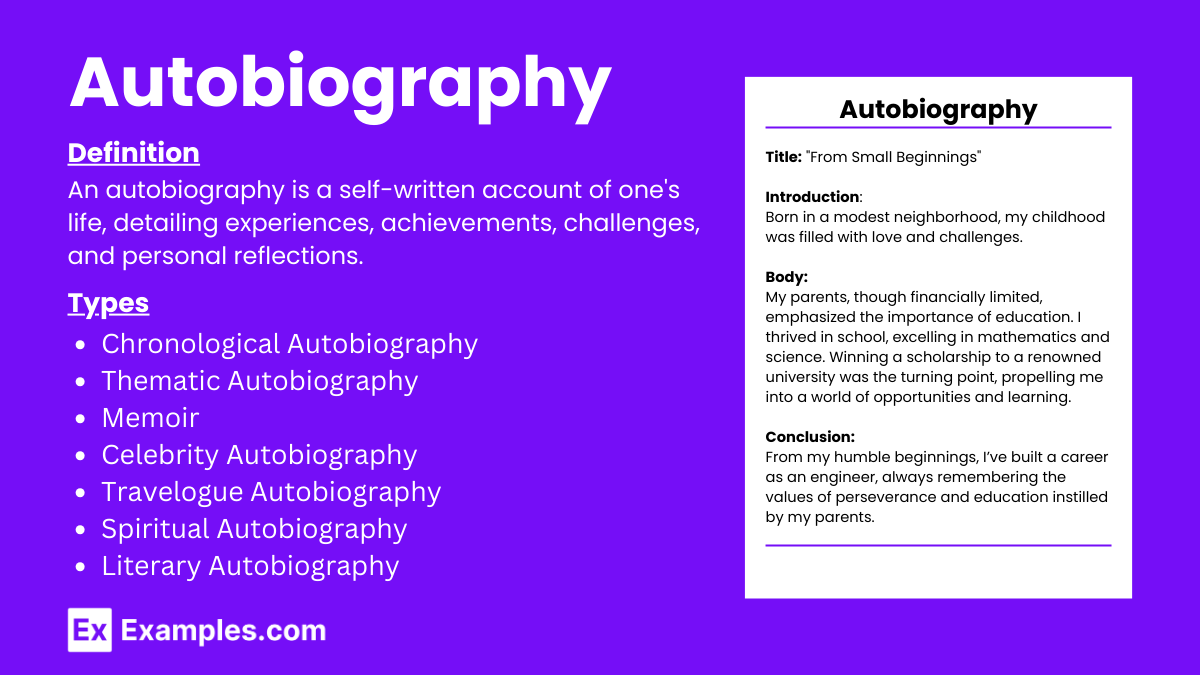
An autobiography is a captivating journey through the life of its author, offering a firsthand account of their experiences, challenges, and triumphs. It provides a unique insight into their personal growth, motivations, and the events that shaped their identity. By sharing intimate details and reflections, an autobiography connects readers to the author’s world, making their story both relatable and inspiring.
What Is an Autobiography?
An autobiography is a self-written account of the author’s own life, detailing personal experiences, significant events, and milestones. It is written from the first-person perspective and provides insight into the author’s thoughts, feelings, and reflections.
Types of Autobiography
- Full Autobiography: Covers the entire life of the author, from birth to the present or the end of their life.
- Memoir: Focuses on specific events, periods, or themes in the author’s life rather than their entire life.
- Personal Essay: A short piece that explores a particular aspect or experience in the author’s life.
- Confessional: Reveals deeply personal and often private aspects of the author’s life, usually with a focus on emotional experiences.
- Spiritual Autobiography: Focuses on the author’s spiritual journey and experiences.
- Political/Professional Autobiography: Concentrates on the author’s career, achievements, and professional experiences.
- Coming-of-Age Autobiography: Centers around the author’s formative years, detailing the transition from childhood to adulthood.
Autobiography format
1. title page.
- Title of the Autobiography
- Author’s Name
2. Table of Contents
- List of chapters and page numbers
3. Preface or Introduction
- Author’s purpose for writing
- Brief overview of what the reader can expect
4. Chronological Structure
- Chapter 1: Early Life
- Birth details
- Family background
- Childhood experiences
- Chapter 2: Education
- Schools attended
- Significant academic achievements
- Memorable teachers or mentors
- Chapter 3: Career Beginnings
- First job experiences
- Early challenges and successes
- Chapter 4: Major Life Events
- Personal milestones (e.g., marriage, children)
- Key professional achievements
- Chapter 5: Challenges and Triumphs
- Obstacles faced and how they were overcome
- Turning points and life lessons
- Chapter 6: Reflections
- Personal growth and insights
- Future aspirations
5. Epilogue
- Summary of the author’s journey
- Final thoughts and messages to readers
6. Appendices (if applicable)
- Photos, documents, letters
7. References or Acknowledgements
- Credits to individuals who helped in the writing process
Examples of Autobiography
1. early life and education.
Title: “From Small Beginnings” Introduction: Born in a modest neighborhood, my childhood was filled with love and challenges. Body: My parents, though financially limited, emphasized the importance of education. I thrived in school, excelling in mathematics and science. Winning a scholarship to a renowned university was the turning point, propelling me into a world of opportunities and learning. Conclusion: From my humble beginnings, I’ve built a career as an engineer, always remembering the values of perseverance and education instilled by my parents.
2. Professional Growth
Title: “Climbing the Corporate Ladder” Introduction: Starting as an intern at a large corporation, I had big dreams but limited experience. Body: Through hard work and dedication, I navigated various roles, learning from mentors and overcoming numerous obstacles. Each promotion was a testament to my commitment and skills. My most significant achievement was leading a project that significantly boosted the company’s revenue. Conclusion: Today, as a senior executive, I reflect on my journey with pride, knowing that every step was a building block to my success.
3. Personal Transformation
Title: “A Journey to Wellness” Introduction: Struggling with obesity since childhood, my health was always a concern. Body: At 30, a health scare prompted a lifestyle change. I adopted a balanced diet, regular exercise, and mindfulness practices. The transformation was challenging but rewarding, leading to significant weight loss and improved mental health. Conclusion: Now, as a fitness coach, I inspire others with my story, proving that it’s never too late to prioritize health and wellness.
4. Overcoming Adversity
Title: “Turning Tragedy into Triumph” Introduction: Losing my job during an economic downturn was a devastating blow. Body: With no immediate prospects, I decided to start my own business. The journey was fraught with challenges, but each setback was a lesson. Gradually, my small startup grew into a successful enterprise, providing jobs and supporting the community. Conclusion: From the ashes of my job loss, I built a thriving business, demonstrating resilience and the power of entrepreneurship.
5. Lifelong Passion
Title: “The Art of Perseverance” Introduction: Art has always been my passion, but pursuing it as a career seemed unrealistic. Body: Despite societal pressure to choose a conventional path, I followed my heart. Years of dedication, attending art school, and countless hours of practice led to my first gallery exhibition. The positive reception was a dream come true. Conclusion: Today, as a recognized artist, I live my passion every day, encouraging others to pursue their dreams relentlessly.
Examples of Autobiography in literature
Autobiographies provide a window into the personal lives and experiences of individuals, offering readers an intimate look at their journeys, thoughts, and emotions. Here are some notable examples of autobiographies in literature:
1. “The Diary of a Young Girl” by Anne Frank
Anne Frank’s poignant diary, written during her time hiding from the Nazis in World War II, offers a powerful and moving account of her life, fears, and hopes. Her writing provides a personal perspective on the horrors of war and the resilience of the human spirit.
2. “Long Walk to Freedom” by Nelson Mandela
Nelson Mandela’s autobiography chronicles his early life, education, and 27 years in prison, detailing his role in the fight against apartheid in South Africa. His narrative is a testament to his dedication to justice and equality.
3. “I Know Why the Caged Bird Sings” by Maya Angelou
Maya Angelou’s first autobiography covers her childhood and teenage years, addressing themes of identity, racism, and literacy. Her lyrical and evocative prose makes this a significant work in American literature.
4. “The Story of My Life” by Helen Keller
Helen Keller’s autobiography recounts her experiences growing up deaf and blind and her journey to learn to communicate. Her story is inspiring and highlights the importance of perseverance and education.
5. “Dreams from My Father” by Barack Obama
This memoir by former President Barack Obama explores his upbringing, his search for identity, and his early career in community organizing. The book offers insights into his personal life and the formative experiences that shaped his worldview.
6. “Bossypants” by Tina Fey
Tina Fey’s humorous autobiography covers her career in comedy, from her early days in improv to her work on “Saturday Night Live” and “30 Rock.” Her witty and candid writing provides an entertaining look at her life and career.
7. “Becoming” by Michelle Obama
In her autobiography, Michelle Obama shares her journey from her childhood in Chicago to her years as the First Lady of the United States. Her story is one of resilience, hope, and the pursuit of excellence.
8. “Narrative of the Life of Frederick Douglass, an American Slave” by Frederick Douglass
Frederick Douglass’s powerful autobiography details his life as a slave and his journey to freedom. His narrative is a critical work in American history and literature, highlighting the brutality of slavery and the importance of freedom.
9. “The Autobiography of Malcolm X” as told to Alex Haley
This autobiography of Malcolm X, written with the assistance of Alex Haley, covers his life from his troubled youth to his conversion to Islam and his work as a civil rights activist. The book provides deep insights into his beliefs and the evolution of his views.
10. “The Glass Castle” by Jeannette Walls
Jeannette Walls’s memoir recounts her unconventional and often challenging upbringing with her deeply dysfunctional parents. Her story is both heartbreaking and uplifting, showcasing her determination to overcome adversity.
Examples of Autobiography for students
An autobiography is a self-written account of one’s own life. Here are some examples tailored for students to help them understand how to write their own autobiographies.
1. Elementary School Student
My life so far.
My name is Emma Johnson, and I am eight years old. I was born on June 5, 2016, in Austin, Texas. I live with my mom, dad, and my little brother, Liam. We also have a dog named Buddy.
I go to Maple Elementary School, and I am in the third grade. My favorite subjects are art and science. I love drawing and doing experiments. When I grow up, I want to be a scientist and discover new things.
In my free time, I like to play soccer with my friends and read books about space. My favorite book is “The Magic School Bus: Lost in the Solar System.” I also enjoy baking cookies with my mom and watching movies with my family.
2. Middle School Student
A journey of learning and fun.
Hello! My name is Michael Brown, and I am 12 years old. I was born on March 14, 2012, in Seattle, Washington. I have an older sister named Sarah, and we get along really well.
I attend Pinewood Middle School and am currently in the seventh grade. My favorite subjects are math and history. I find math challenging but exciting, and I love learning about historical events and figures.
I am part of the school’s basketball team and play as a point guard. Basketball has taught me a lot about teamwork and perseverance. In addition to sports, I enjoy playing video games and coding. I recently started learning Python, and it’s fascinating to create my own games.
3. High School Student
My path to adulthood.
I am Samantha Carter, a 16-year-old junior at Lincoln High School in Chicago, Illinois. I was born on August 21, 2007, and have two younger brothers, David and Andrew. My parents are both teachers, which has inspired me to value education.
At school, I excel in English and biology. I am particularly passionate about creative writing and have won several awards for my short stories. I am also a member of the school’s debate team, which has greatly improved my public speaking skills.
Outside of academics, I volunteer at the local animal shelter, where I help take care of abandoned pets. This experience has been incredibly rewarding and has inspired me to consider a career in veterinary medicine. In my spare time, I enjoy hiking, reading novels, and spending time with my friends.

4. College Student
Chasing dreams and building a future.
My name is James Lee, and I am a 20-year-old sophomore at the University of California, Berkeley. I was born on February 10, 2004, in San Francisco, California. I am the eldest of three siblings, with a younger brother and sister.
I am majoring in Computer Science, and I am fascinated by artificial intelligence and machine learning. My interest in technology began when I was in high school and participated in a robotics club. Since then, I have worked on various projects, including developing apps and working on AI models.
In addition to my studies, I am part of the university’s coding club and participate in hackathons regularly. I also work part-time as a research assistant in the computer science department. My goal is to contribute to cutting-edge technology that can make a positive impact on the world.
Outside of academics and work, I enjoy playing the guitar, exploring new cuisines, and traveling. My most memorable trip was to Japan, where I immersed myself in the culture and learned a lot about their technological advancements.
5. High School Freshman
A new beginning.
My name is Alex Martinez, and I am 14 years old. I was born on November 3, 2009, in Miami, Florida. I live with my mom, dad, and older sister, Isabella. We also have a parrot named Coco who loves to mimic our conversations.
I recently started my freshman year at Coral Reef High School, and it’s been a big transition from middle school. My favorite subjects are biology and art. I love learning about living organisms and how they interact with their environment. Drawing and painting are my creative outlets, and I often combine these interests by sketching animals and plants.
In middle school, I was part of the science club and participated in several science fairs. One of my proudest moments was winning first place for my project on renewable energy sources. This experience sparked my interest in environmental science, and I hope to pursue this field further in high school and beyond.
Outside of school, I enjoy swimming and am part of a local swim team. Training and competing in swim meets have taught me discipline and the importance of hard work. I also volunteer at a community garden, where I help grow vegetables and learn about sustainable farming practices.
In my free time, I love reading adventure novels and exploring nature trails with my family. My dream is to become a marine biologist and work on preserving ocean ecosystems. I am excited about the opportunities high school will bring and look forward to making new friends and discovering new passions.
Short Autobiography examples
1. academic journey.
A Path of Lifelong Learning My name is Sarah Johnson. Growing up in a small Ohio town, I was the first in my family to attend college. I earned my Bachelor’s in English Literature from Ohio State University and a Master’s from the University of Chicago. Now, as a high school English teacher, I strive to inspire my students with a love for literature.
2. Overcoming Adversity
Rising Above Challenges I’m Michael Thompson from Detroit. Despite a tough upbringing, I excelled academically and earned a scholarship to Michigan State University. Majoring in Sociology, I focused on social justice. Now, I work with at-risk youth in Detroit, using my experiences to guide and mentor them.
3. Passion for Art
From Canvas to Community My name is Emma Williams, and I grew up in San Francisco. I attended the California College of the Arts, where I developed my skills and completed a mural project celebrating San Francisco’s diversity. Now, I run a nonprofit, Art for All, providing art education to underserved communities.
4. Career in Technology
Innovating for a Better Tomorrow I’m David Harris from Silicon Valley. My interest in technology led me to pursue a Computer Science degree at Stanford University, specializing in artificial intelligence. Today, I work as a software engineer at a startup focused on sustainable tech solutions.
5. A Love for Music
Harmonizing Life My name is Lisa Chen, a musician from New York City. I began playing the piano at age five and later attended Juilliard School. After graduating, I performed with orchestras worldwide and now teach music, sharing my passion with the next generation of musicians.
Examples of Autobiography for College students
1. discovering my passion for environmental science.
Discovering My Passion for Environmental Science My name is Jessica Brown, and I am a junior majoring in Environmental Science at the University of California, Berkeley. Growing up in a small town surrounded by nature, I developed a deep appreciation for the environment. In high school, I joined the Eco-Club and participated in several local clean-up projects, which fueled my interest in environmental conservation. At Berkeley, I have immersed myself in my studies, focusing on sustainable practices and climate change mitigation. Last summer, I interned with a non-profit organization dedicated to preserving coastal ecosystems. This experience solidified my career goal to work in environmental policy and make a tangible impact on our planet.
2. Overcoming Challenges and Achieving Academic Success
Overcoming Challenges and Achieving Academic Success My name is John Martinez, and I am a sophomore at New York University, majoring in Computer Science. Coming from a low-income family in a rough neighborhood, I faced numerous challenges growing up. Despite these obstacles, I excelled academically and became the first in my family to attend college. My journey to NYU was not easy. I balanced multiple part-time jobs to support myself and my family while maintaining a high GPA. The hard work paid off when I received a full scholarship to NYU. Now, I am passionate about using technology to solve real-world problems and hope to inspire others from similar backgrounds to pursue their dreams.
3. Pursuing a Career in Creative Writing
Pursuing a Career in Creative Writing I am Emily Davis, a senior at Columbia University majoring in Creative Writing. Ever since I can remember, I have been captivated by stories and the power of words. In high school, I wrote for the school newspaper and won several creative writing contests. At Columbia, I have honed my writing skills through workshops and feedback from professors and peers. My short stories have been published in several literary magazines, and I am currently working on my first novel. My dream is to become a published author and to teach creative writing to inspire others to find their voice.
4. From Athlete to Future Doctor
From Athlete to Future Doctor My name is Michael Lee, and I am a pre-med junior at Stanford University. As a child, I was passionate about sports and played soccer throughout high school. However, a severe injury during a game sparked my interest in medicine. Witnessing the impact doctors had on my recovery, I decided to pursue a career in healthcare. At Stanford, I am majoring in Biology and volunteering at a local hospital. My goal is to become an orthopedic surgeon, combining my love for sports with my desire to help others heal and achieve their best physical health.
5. Embracing Cultural Heritage Through Anthropology
Embracing Cultural Heritage Through Anthropology I am Alex Kim, a sophomore studying Anthropology at the University of Chicago. Growing up in a multicultural household, I was always fascinated by different cultures and traditions. My family’s heritage sparked my interest in understanding human societies and cultural dynamics. In college, I have conducted research on indigenous cultures and participated in archaeological digs. These experiences have deepened my appreciation for cultural diversity and the importance of preserving our history. My ambition is to work as a cultural anthropologist, contributing to academic research and promoting cross-cultural understanding.
More Examples & Samples of Autobiography in PDF
1. western autobiography.
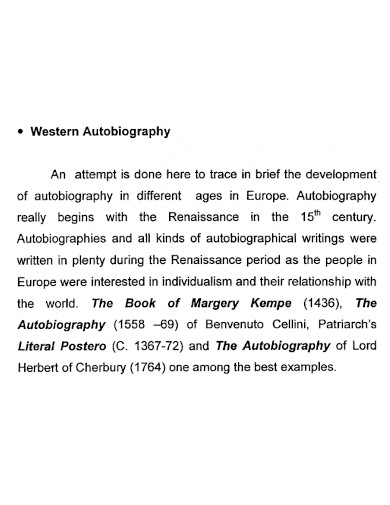
2. Autobiography Sample
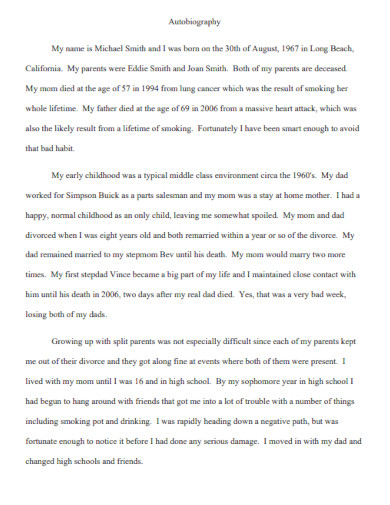
3. Autobiography PDF
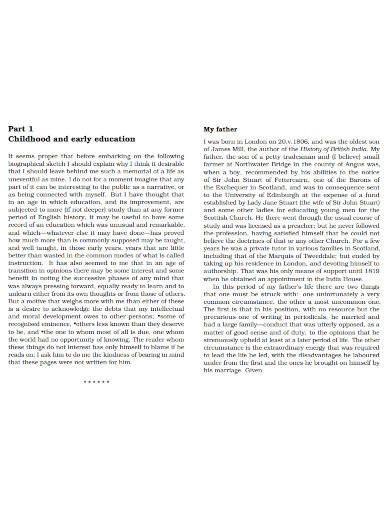
4. Autobiography as a Literary Form
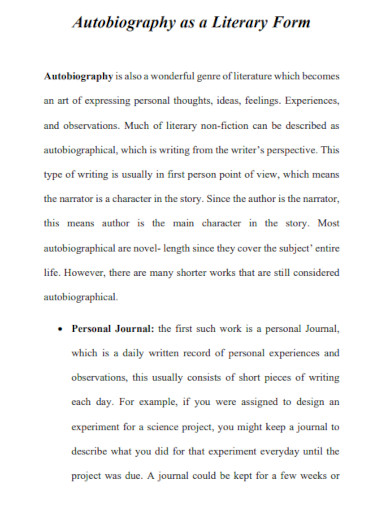
5. Autobiography Format
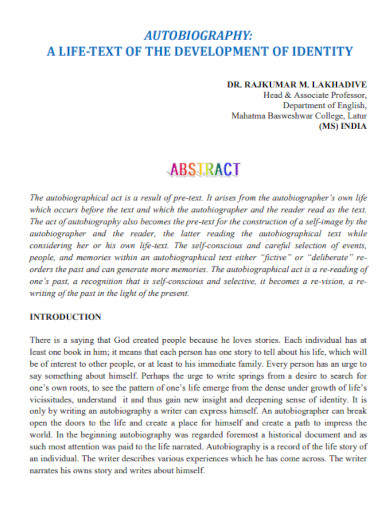
6. Autobiography Sample Template
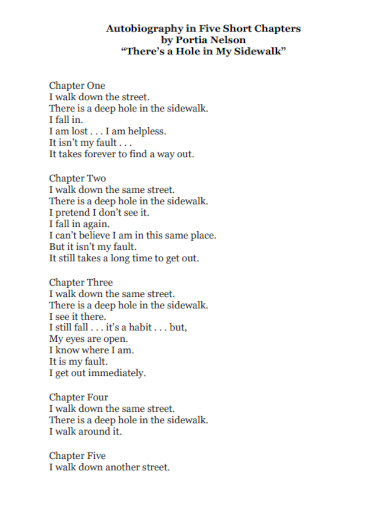
7. Standard Autobiography
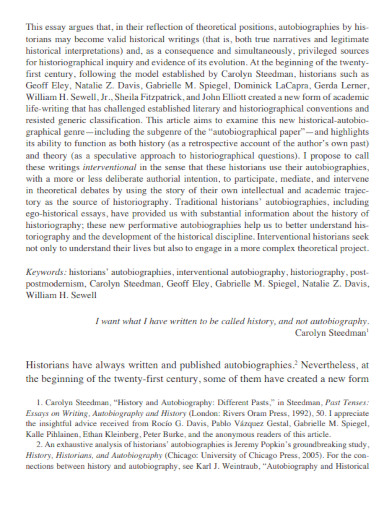
8. The Confessions as Autobiography
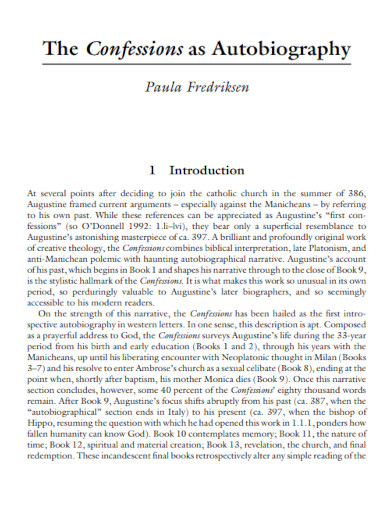
9. Autobiography Sample Lesson Plan
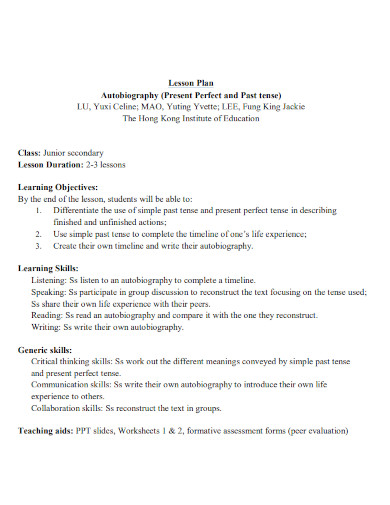
10. Truth in Autobiography
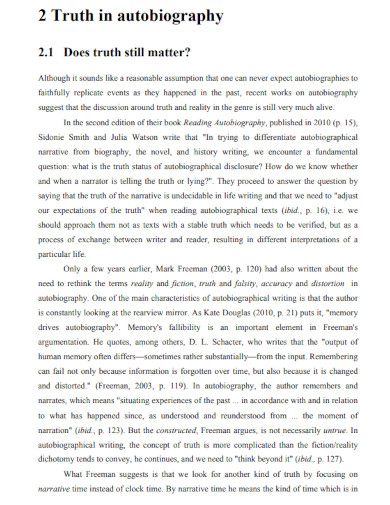
Purpose of an Autobiography
An autobiography serves multiple important purposes, each contributing to the value and significance of this form of writing. Here are some key purposes of an autobiography:
1. Self-Reflection and Understanding
- Self-Awareness: Writing an autobiography allows individuals to reflect on their life experiences, thoughts, and feelings. This reflection can lead to greater self-awareness and understanding of one’s own identity and journey.
- Personal Growth: Through the process of recounting life events, individuals can gain insights into their personal growth and development. It helps in recognizing patterns, learning from past mistakes, and celebrating achievements.
2. Preservation of Memories
- Historical Record: An autobiography serves as a personal historical record, preserving memories and experiences that might otherwise be forgotten. It captures the essence of a person’s life, including significant events, milestones, and personal anecdotes.
- Legacy: For future generations, an autobiography provides a way to learn about the life and times of their ancestors. It becomes a cherished family heirloom that keeps the writer’s legacy alive.
3. Sharing Life Lessons
- Inspiration: By sharing their life stories, individuals can inspire and motivate others. Readers can find courage, strength, and hope in the experiences of the writer, especially when they face similar challenges.
- Education: Autobiographies can educate readers about different cultures, historical periods, and personal experiences. They offer unique perspectives and insights that can broaden the reader’s understanding of the world.
4. Emotional Expression
- Catharsis: Writing an autobiography can be a therapeutic process, allowing individuals to express and process their emotions. It provides a safe space to explore and articulate feelings related to both joyful and painful experiences.
- Connection: Sharing personal stories can create a sense of connection and empathy between the writer and the readers. It fosters a deeper understanding and appreciation of the human experience.
5. Creative Expression
- Artistic Outlet: Autobiographies offer a platform for creative expression. Writers can use their narrative skills to craft compelling and engaging stories, blending factual recounting with literary techniques.
- Voice and Style: Through autobiographies, individuals can develop and showcase their unique voice and writing style. It is a way to express their individuality and creativity.
6. Documentation of Personal Achievements
- Milestones and Achievements: An autobiography highlights the significant milestones and achievements in a person’s life. It serves as a celebration of one’s accomplishments and contributions.
- Professional Journey: For professionals, an autobiography can document their career journey, challenges, successes, and the impact they have made in their field.
Autobiography vs. Biography
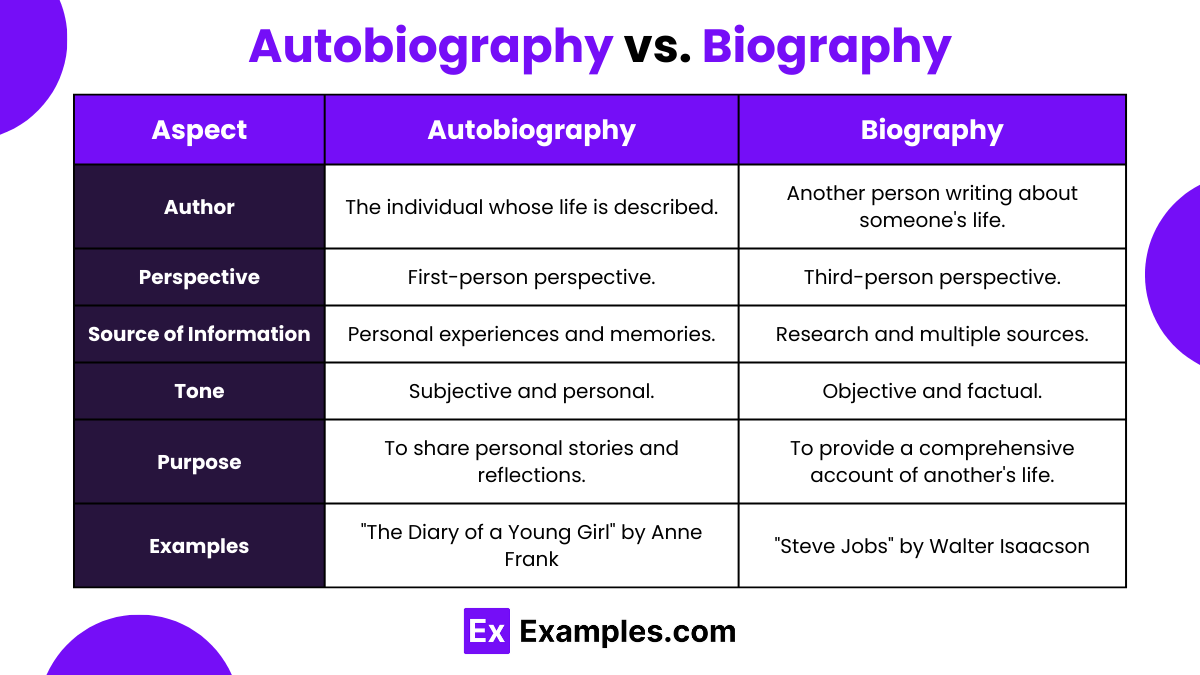
Autobiography vs. Memoir
How to write an autobiography, 1. reflect on your life.
- Take time to think about significant events, experiences, and people that have shaped your life.
- Make a list of key milestones, achievements, challenges, and turning points.
2. Define Your Purpose
- Decide why you are writing your autobiography. Are you documenting your life for family and friends, or do you hope to inspire or educate others?
- Understanding your purpose will help you focus your narrative.
3. Create an Outline
- Organize your thoughts and memories into a chronological or thematic structure.
- Typical sections include childhood, education, career, relationships, and key life events.
4. Start with a Strong Opening
- Grab your reader’s attention with an engaging introduction. You might start with a significant event, a vivid memory, or a statement about your life philosophy.
5. Write Your Story
- Use your outline as a guide and begin writing your story.
- Be honest and authentic. Share your thoughts, feelings, and reflections.
- Include anecdotes, dialogues, and descriptions to bring your experiences to life.
6. Be Honest and Vulnerable
- Authenticity is crucial in an autobiography. Share not only your successes but also your struggles and failures.
- Readers connect with genuine stories and emotions.
7. Include Personal Reflections
- Reflect on the lessons you’ve learned and how your experiences have shaped you.
- This adds depth to your story and provides valuable insights to your readers.
8. Edit and Revise
- After completing your first draft, take a break before revising. This helps you see your work with fresh eyes.
- Check for clarity, coherence, and consistency. Ensure your narrative flows smoothly.
- Correct any grammatical errors and refine your writing style.
9. Seek Feedback
- Share your draft with trusted friends, family members, or writing groups.
- Consider their feedback and make necessary revisions.
10. Polish Your Final Draft
- Ensure your autobiography is well-organized, engaging, and free of errors.
- Add photos or documents that complement your story if appropriate.
How do I start writing an autobiography?
Begin with a captivating hook, then introduce yourself and provide background information. Outline key life events and choose a central theme to guide your narrative.
What should I include in my autobiography?
Include significant life events, achievements, challenges, personal reflections, and key milestones. Focus on moments that shaped your identity and values, and use vivid descriptions.
How long should an autobiography be?
The length can vary, but typically ranges from 50,000 to 100,000 words. Focus on covering important events and themes without overwhelming the reader with unnecessary details.
Should I write my autobiography in chronological order?
Writing in chronological order is common, but you can start with a significant event and backtrack. Ensure your narrative flows logically and maintains reader engagement.
Can I include other people’s stories in my autobiography?
Yes, but obtain their permission if you’re sharing personal details. Focus on how their stories intersect with and influence your life, keeping the main narrative about you.
How do I make my autobiography engaging?
Use vivid descriptions, sensory details, and emotional reflections. Incorporate anecdotes, dialogues, and varied sentence structures to maintain reader interest and make your story relatable.
Do I need to be famous to write an autobiography?
No, anyone can write an autobiography. Every life has unique experiences and lessons that can inspire, inform, and entertain readers, regardless of the writer’s fame.
How honest should I be in my autobiography?
Aim for honesty and authenticity, but be considerate of others’ privacy and feelings. Balance transparency with respect, and avoid including harmful or unnecessary details.
Can I use humor in my autobiography?
Absolutely! Humor can make your story more engaging and relatable. Use it appropriately to lighten serious topics or provide a fresh perspective on your experiences.
How do I conclude my autobiography?
Summarize key points and reflect on your life journey. Share lessons learned, future aspirations, and final thoughts to provide closure and leave a lasting impression on readers.
Text prompt
- Instructive
- Professional
10 Examples of Public speaking
20 Examples of Gas lighting

IMAGES
VIDEO
COMMENTS
Here, we provide you with an example that will help you get that scholarship. How to Write an Autobiography for Scholarship. When writing your autobiography, focus on what your grade sheets, letters of recommendation, and other additional documents you have given for your admission do not focus on. This is your chance to prove your suitability ...
e. Read the paper aloud to check sentence sense. 6. Type a clean copy of the autobiography and edit what you have written. 1. Use language that is direct, clear, and sounds like you. However, avoid slang and overused expressions. 2. Create a tone that shows confidence, but not arrogance; sincerity, not stuffiness.
Strong Introduction. A winning biography begins with a captivating introduction. Your opening sentence serves as a way to get the reader to read more. Begin with a sentence that describes who you are and why you're an ideal choice for the scholarship. For example, if you're applying for a flute scholarship, explain when you began playing and ...
Some scholarships applications may require you to write an autobiographical essay, also known as a personal essay. Take your time when writing this, as it often is the key determinant of whether you receive the scholarship. Create an outline for your autobiographical essay. At the very least, include sections that describe your personal ...
In writing an autobiography for a scholarship, it is crucial to effectively present your background and experiences. Start by outlining the major events and milestones that have shaped your life. Think about your childhood, academic achievements, extracurricular activities, and any challenges you have overcome.
Short scholarship essay example: Tell us about yourself (100 Words) With 100 words, you can only focus on one or two elements of your life. Think about your biggest selling points - the things that show you are the ideal candidate. Start by introducing yourself and your educational status.
Hello! Writing a professional biography for a scholarship application is a great opportunity to showcase your achievements, skills, and future goals. Here are some tips and a brief outline to help you create a compelling professional bio: 1. Start with an attention-grabbing opening sentence: Begin by introducing yourself with a strong statement that encapsulates your background, current ...
Any advice would be appreciated! In writing a biography for a college scholarship application, the key is striking a balance between your personal journey, academic achievements, and extracurricular activities. Starting with a compelling introduction can hook the reader. A unique aspect about you or a concise statement of your aspirations could ...
When writing a short biography for a scholarship application, it's essential to focus on the most relevant and impressive aspects of your personal, academic, and extracurricular life. Here's a breakdown of the key components you should consider including in your biography: 1. Introduction: Introduce yourself by sharing your name, current educational institution, and year/class level.
Examples of Autobiography for students. An autobiography is a self-written account of one's own life. Here are some examples tailored for students to help them understand how to write their own autobiographies. 1. Elementary School Student. My Life So Far. My name is Emma Johnson, and I am eight years old.